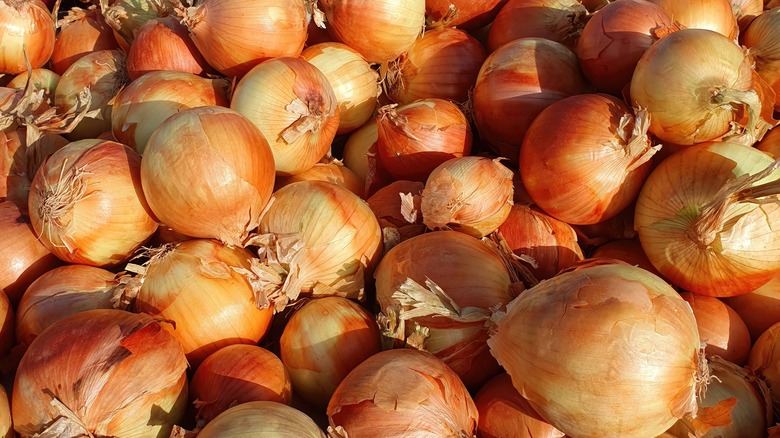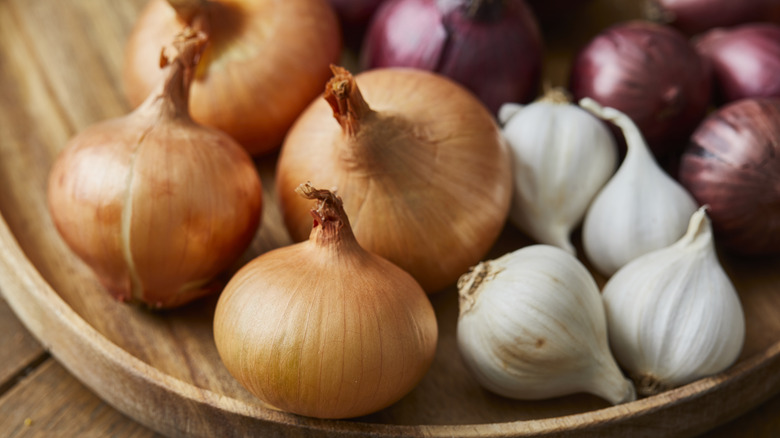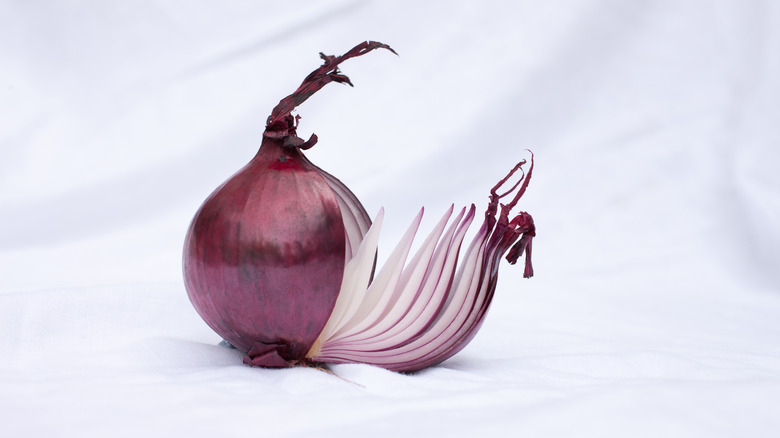Storing Onions In The Fridge Is A Mushy Mistake
Vegetables are some of the fussiest ingredients to store in the kitchen. On top of having to learn how to pick the freshest perishable groceries, you must consider airflow and temperature when storing any produce. You also have to deal with ethylene, a plant hormone that promotes maturation, which many leafy greens and cruciferous vegetables are sensitive to. Onions might be one of the pickiest vegetables to keep fresh, as they can easily get ruined (or ruin surrounding produce) if stored incorrectly. You'll want to be careful whenever you're storing these bulbs, and most importantly, keep them away from the fridge.
Refrigerators are cold, humid environments, which are typically the ideal conditions to preserve delicate vegetables like lettuce. Onions, on the other hand, are hardy roots that easily absorb moisture. This not only leads to faster wilting in the fridge but also the breaking down of an onion's natural starches, resulting in a loss of volume over time.
Onions thrive in cool, dry environments, which makes them ideal candidates for an open bowl in a dark but airy pantry. They also like plenty of circulation, so remove your alliums from any bag or sealable container before you pack them away.
Keep your onions away from your taters
Onions require a bit more strategy than many other vegetables that you can just toss in your crisper and forget about. First, because onions emit ethylene, they can easily spoil nearby produce that doesn't tolerate the gas well. This includes tubers that you might also store in a pantry, such as potatoes and yams, which are more likely to rot when near onions.
Conversely, your alliums aren't immune to damage when stored alongside potatoes either. Because spuds are high-moisture vegetables that release humidity, onions kept near them are more likely to sprout or, worse yet, rot.
Instead of dumping all your shelf-stable vegetables in one large box, place your taters in a bowl separate from your onions. Thankfully, you don't have to keep them too far from each other to prevent these issues either. Just having two separate bowls alongside each other or, better yet, a tiered wire basket, should do the trick. You can also nestle garlic with onions, helping you minimize pantry usage without compromising the quality of your produce.
Other tips for storing onions in your kitchen
Cut onions are the exception as their moist insides can definitely spoil if left out at room temperature for too long. These can be refrigerated in an airtight container or bag for approximately a week after slicing. This container should ideally be glass, as plastic reusables will only absorb the musky smells of your cut onion. Leftover halved onions, which are not diced and still retain part of their original bulbous shape, can be tightly sealed in plastic wrap and placed in the fridge and away from ethylene-sensitive produce.
Halved or chopped onions last up to ten days in the fridge. While some home cooks might be able to use it up within a week, some might not. If you suspect that you won't be able to use up all your leftovers, you can store your chopped onions in the freezer instead. Keep in mind that freezing will cause your onions to soften up, so only use it for cooked dishes where it doesn't have to have some bite.



